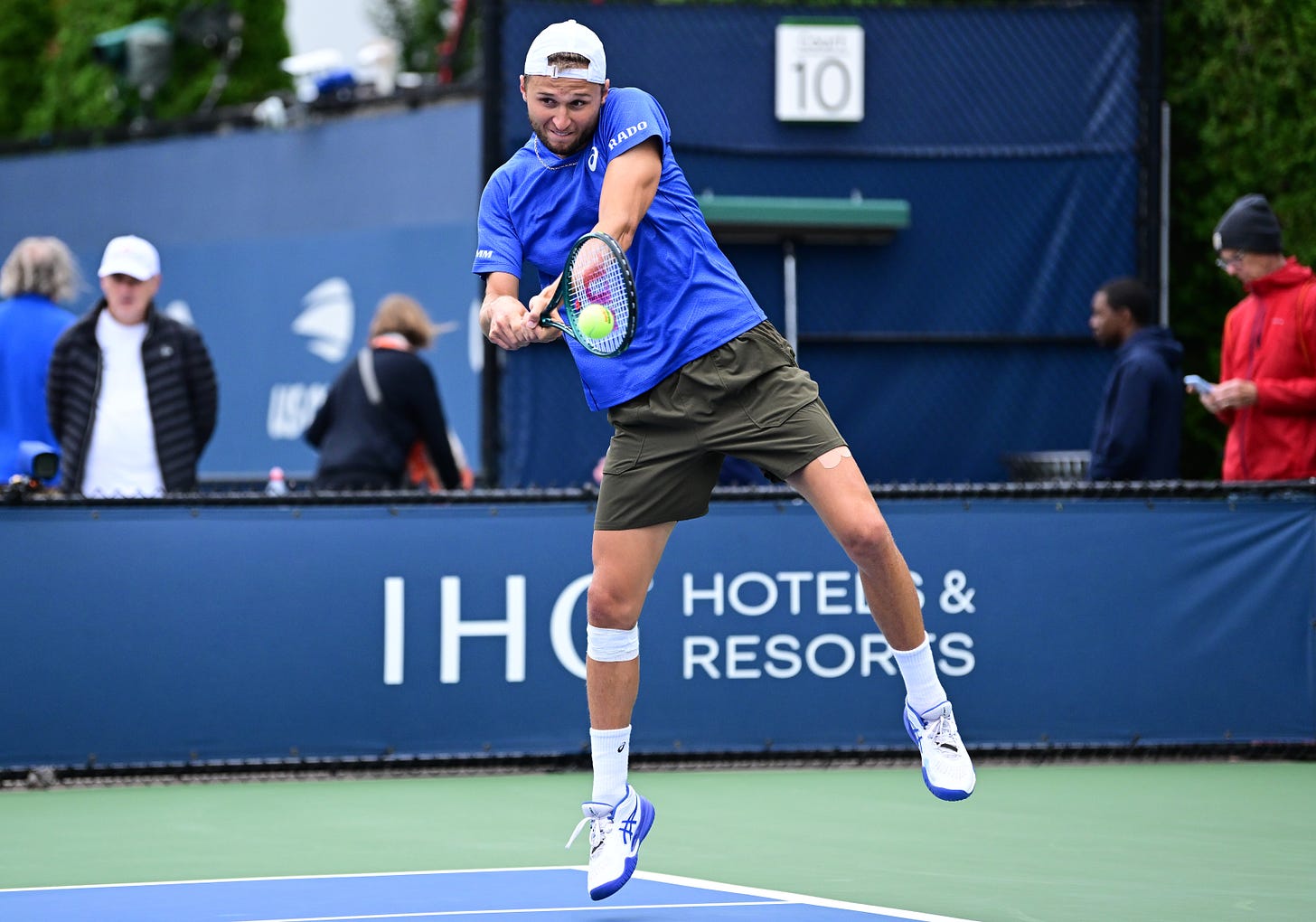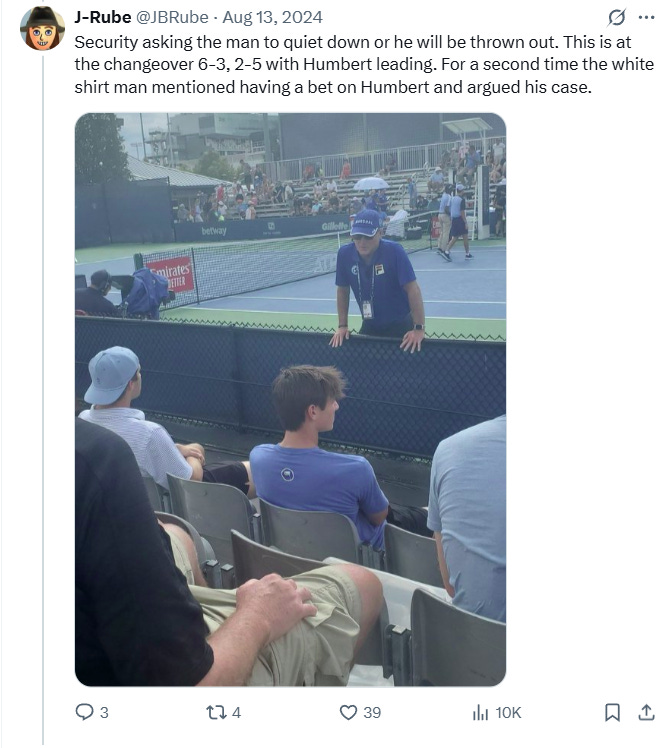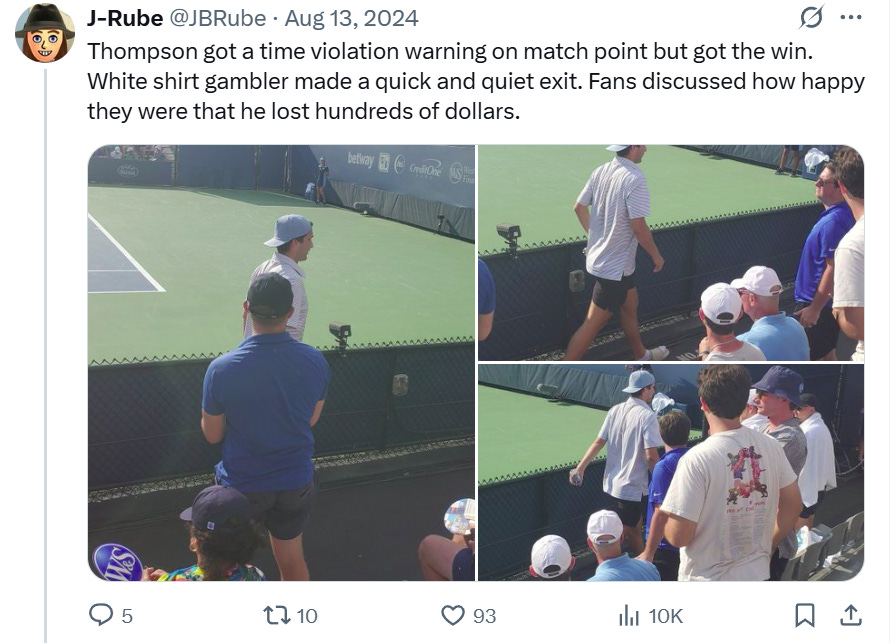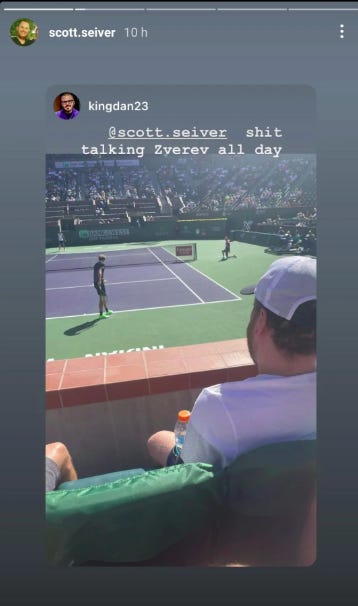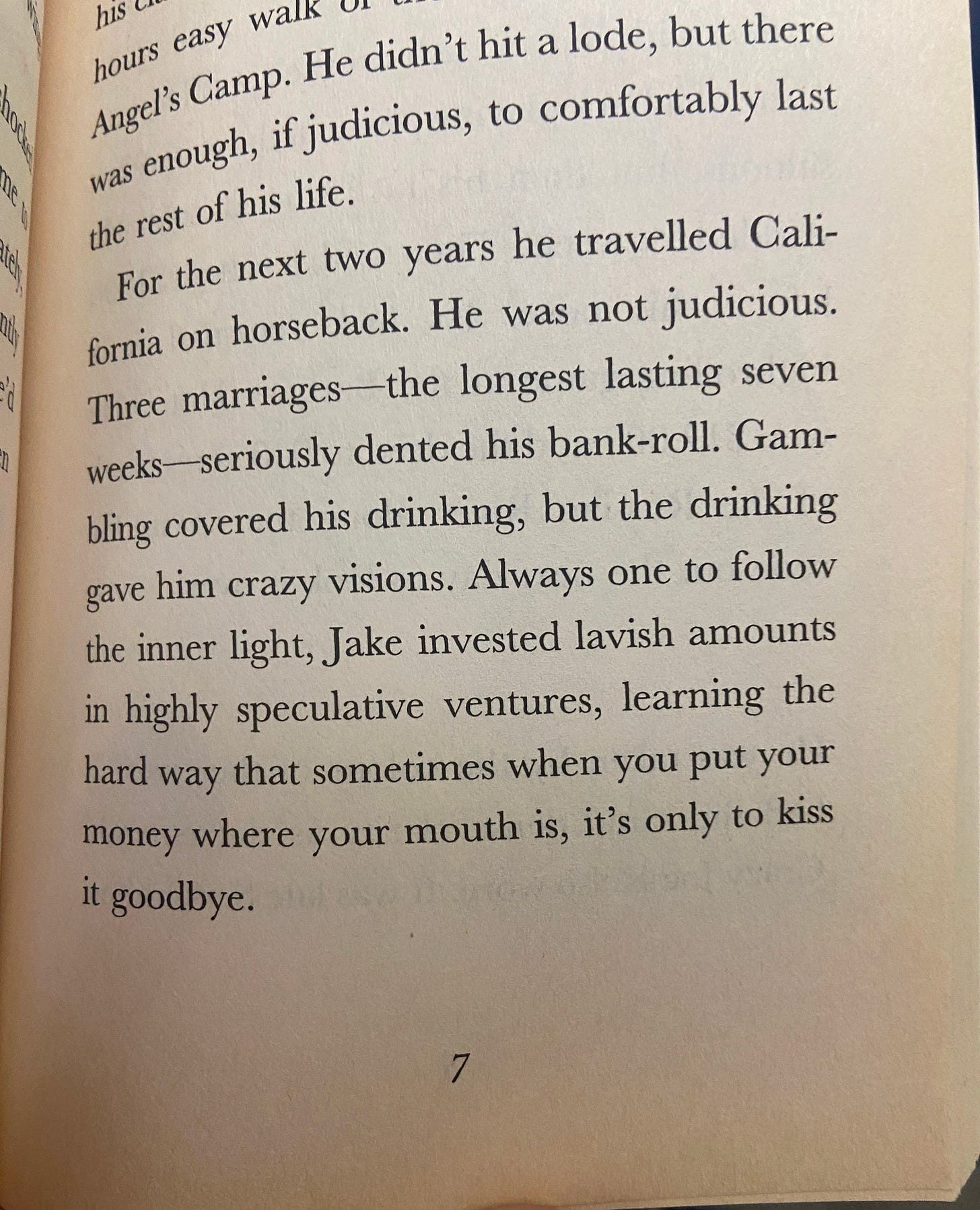Against the Odds
As gambling proliferates at tennis tournaments, one player at the U.S. Open wanted no support from a boisterous bettor.
NEW YORK — Leandro Riedi, a 23-year-old Swiss qualifier ranked 435th, missed a forehand long down break point in the fourth set of his second round match on Thursday afternoon at the U.S. Open, and unleashed a torrent of annoyed Swiss German, his native language.1
As he sat down in his chair, his concentration on his own misery was broken by a spectator sitting across from him on Court 5, screaming a non-stop stream of encouragement toward him. This man had been loudly cheering for Riedi throughout the match; he had also been cheering vociferously at Riedi’s first round match.
The man was trying to be positive, but Riedi thought he could see through his motives.
“Leandro, one at time! One at a time, Leandro! Don’t let them get to—”
“Man, shut up!” Riedi barked.
Riedi then turned and looked up toward chair umpire Scotty Moore to explain why he had reacted that way toward an apparent supporter.
“He’s just betting for me,” Riedi said. “And now, if I lose, he will text me. He’s one of these guys. Get him off. I don’t want to see this guy. If I lose, he’s texting me: ‘You’re so bad, I hope your mother dies.’”
Moore got on his telephone after Riedi’s request, but according to the USTA, the chastised fan left Court 5 of his own accord before needing to be formally ejected.
After the match, I asked Riedi how he could sense when a fan in the stands has a financially vested in his victory and has decided to put their mouth where their money is.
“You can definitely see it immediately,” Riedi told Bounces. “I've experienced it enough now. I saw he was already at the first round, and he was screaming my name after the first point. I was like, ‘Wow, that's a guy who's betting, for sure.’”
Riedi said that it was as he was getting closer to defeat on Thursday that he became fed up with fickle fandom, and made it clear how much he associates gambling with the angry messages from aggrieved gamblers that fill his direct message inbox after each loss, as happens for nearly all tennis players.
“In the fourth set I was still behind and I was like: if I lose this match he will text me and say how bad I am and wish my mother dies,” Riedi repeated. “So I was, like, no, this guy can't be here, I don't want to see that guy. And then he's pushing me and then if I lose he's going to text me. That's why I just said, ‘Can you please go? I don't need this now.’”
With the loudest member of the crowd gone, Riedi carried on and completed a remarkable comeback victory, 3-6, 4-6, 6-4, 6-4, 6-2 over 19th-seeded Francisco Cerundolo.
The breakthrough win to reach the third round was the best win of Riedi’s life by some distance, and a remarkable comeback from two knee surgeries in the past year. The $237,000 he earned for reaching the third round of this U.S. Open is nearly half of the $644,653 he’d made in career prize money.
How the Cash Registers
Such a paycheck is new to Riedi; what’s not new to him is identifying likely bettors in the stands.
“For me it's always when they're on the phone,” Riedi said of his first clue. “When they have the phone, and every time when they have a break, they look and they [frantic scrolling].”
Riedi also suggested that certain sartorial choices give away a gambler.
“I'm not judging everyone by their outfit, but they’re mostly in trainers, mostly a cap, sunglasses, and just always there. Haven't experienced a female, no; just men.”
This particular believed bettor, Riedi said, wasn’t trying to keep any sort of poker face.
“I know he was a [betting] guy because, especially for example, when my opponent did a double fault in the first round—he was going nuts,” Riedi said. “I was like, this guy doesn't know anything about tennis—or just wants me to win. Because I know my ranking is, like, 400. So I think if I win, for the bettors, it's nice. Maybe he was just going all in on me.”
Riedi said he had to puncture a family member’s illusions about the fan support he’s been getting in New York: “It was funny, my cousin came watching and he's like, ‘Wow, you had a big fan!’ I was like ‘No, no, this guy was not a big fan, trust me. This guy is a bettor.”
Even if the man was going all in vocally in a way intended to urge him to victory, Riedi—who is a sentient human being and not a pair of dice on a craps table or an oblivious racehorse coming down the homestretch—still felt annoyed to realize what was going on.
“It's annoying because I feel bad for my opponent,” Riedi said. “And then I also said on the first round, like, ‘He can go; he has nothing to do with me. I don't know this guy, he's just betting.’ And then it was so much emotion today in that match. When I saw this guy and then he told me, ‘Keep going!’ I was just so mad about the situation. I was like, ‘No, no, please no. And then I told [the umpire: can he please go?”
Riedi was relieved the man left, and did sound one note of cautious contrition.
“If he really is such a tennis fan, then I'm sorry, but I'm pretty sure he's not,” he said. “But if he is, I truly apologize—but I don't think so.”
Riedi that this guy probably didn’t need much of an apology: after all, his ultimate victory in the end likely meant a big windfall for him.
“Well, you won him a lot of money,” I said.
Riedi chuckled ruefully at that reality.
“Mixed feelings,” he said.
Betting Becomes Bigger and Bigger
Riedi’s moment jumped out when I saw it—a hat-tip to Friend of the Show Ricky Dimon for flagging it when it happened live—because this trend has been something I’ve been interested for a few years now as legal betting and mobile betting has proliferated.
I’ve seen for myself how fans become emotionally invested in a match in new, more intense ways once they’re invested financially. It’s added a different element to attending matches in person, particularly matches between two players who probably wouldn’t be expected to stir many strong emotions, like Riedi-Cerundolo.
Earlier this year in Australia, there was a group of four men sitting a couple rows in front of me inside Margaret Court Arena, wearing olfactorily assaulting amounts of cologne and betting on Daniil Medvedev to complete his comeback and beat Learner Tien. They were frequently checking odds on their phones, and shouting for Medvedev in a mix of English and Russian phrases they were looking up on Google Translate. When Tien prevailed, they departed as sad and stinky losers.
Sure enough, several players I asked about this trend after talking to Riedi had their own examples ready to share.
Kamil Majchrzak, who upset ninth-seeded Karen Khachanov on Thursday to book a spot in the third round—where he will face Riedi and whatever fans might be invested in him—said he had first-hand experience both as a player and as an observer.
“Honestly, yeah, I've experienced that a couple of times on my matches,” Majchrzak said. “I'm just trying to ignore what's happening and focus on the game and focus on the interaction with my team. Or if this is really too much, I can ask the chair umpire to tell them to either stop or or leave. Sometimes I also tell them myself, when I'm a bit nervous, to be quiet or to not talk to me, something like that.”
Majchrzak’s most vivid memory of seeing how gambling can sway the public came from when he himself was on the perimeter of a court, watching a first round match at the Madrid Challenger he eventually won this May in Madrid.
“A young Spanish guy gets a wildcard to play against foreigner, and the whole crowd is supporting the foreigner guy—because, I assume, they bet on the other guy. They have this fun on site and they support the other guy, instead of a young Spanish at home.
“That was kind of, from [the young Spanish player’s] perspective, probably a difficult experience. But from my point of view, I was like, ‘Wow, this is serious.’ And yeah, I think people want to get engaged with the match, but obviously there is a borderline between being engaged and being too much. But yeah, that's probably how this is gonna be. I don't expect changes.”
Sam Querrey, continuing his star turn in tennis broadcasting by working for ESPN at this U.S. Open, told me he had started wondering when seeing a group of men get extremely animated in the front row of a Renata Zarazua match at this U.S. Open.
“I’m watching her play and there's a group of guys front row that are getting fired up cheering for her—and you just kind of wonder…why,” Querrey said. “I'm assuming they don't know who she is, you don't if they're betting on it or not…but it makes sense.”
Querrey said he had wondered about similar motives during his own playing career.
“Sometimes you'd have people cheering against you or for you; again, you never knew,” Querrey said. “You would just think, like, ‘Alright, I'm on a back court in Rome’ there's some random dude, very passionate, one way or the other. Like, why do you care so much? And you would think, yeah, maybe he's betting on it. Which is fine—I’ve got no problem with it.”
Alexander Bublik—in an interview you will see more of soon on Bounces—told me he hadn’t been assuming that fans who get particularly loud at matches did so because they had money on the line, but nor was he offended by that suggestion.
“I guess whatever is working,” Bublik said. “Whatever it takes to bring more fans or people—even if it's betting on certain players win or lose—I guess that's good, no? People are coming. You have full stands. If the cause is only betting, I guess that's fine, no? Like me, as a player, I don't care. I want to see a full crowd every time. If it is because they bet whatever on some player, I'm totally fine with that, you know? As long as it's not becoming for them to jump on court and try to kill us, that's totally fine.”
The Price of Proximity
The note Bublik ended on is an important one: as annoying as cheering too much for a player could be—toxic positivity, perhaps—the dicier situations are when a bettor in the stands decides to go negatively at the opponent whom they want to take off his or her game to increase their odds of winning by playing offense.
The eagle-eyed J-Rube watched from the stands at an outer court at the Cincinnati Open last year as two young men taunted Jordan Thompson and used their phones to place bets on his opponent, Ugo Humbert, on DraftKings.
Chair umpire Mo Lahyani walked over to the men to try to calm them down; they were later approached by tournament security as well.
The heckling backfired spectacularly: an ultra-motivated Thompson won and the men lost. As Thompson later told me: “That’s all my goal was out there: I need to win this match to send this clown home.”
Other times, the taunting can be wildly successful and lucrative. At the 2021 Indian Wells tournament—the odd autumnal one—one gambler bought himself a front seat, heckled aggressively, and made it rain like the cash was deciduous.
From my article about the proliferation of legal betting in tennis (and advertising on Tennis Channel) later that year in Racquet:
Professional poker player Scott Seiver got a ticket in the front row of the stadium for a men’s quarterfinal match at Indian Wells in October 2021 not just to watch, but to be heard.
From behind the baseline, Seiver repeatedly heckled the heavily favored Alexander Zverev as he tried to serve for the victory in the third set against American Taylor Fritz.
Zverev, visibly rattled, put his finger to his lips at one point to tell Seiver to be quiet.
Seiver bragged about his disruptions on Twitter as the match progressed.
“He double faults next point and I shush him back,” Seiver tweeted. “He’s shook.”
Indeed, from match point up, a shaken Zverev collapsed spectacularly in the match, hitting several wild errors. Seiver boasted that he had “taunted Zverev out of his match” after he lost in a third-set tiebreak.
Seiver bragged on Twitter that he had banked more than $180,000 by wagering that Zverev would lose the match.
“So much value being first row,” Seiver wrote.
As a post-note epigraph to this story, I loved this line from Fup by Jim Dodge, the novella I read on my subway rides to the U.S. Open last week:
“Sometimes when you put your money where your mouth is, it’s only to kiss it goodbye.”
Thanks for reading! If you enjoyed this story, I think you’ll enjoy more of what Bounces has to offer!
Beyond this paywall below for Bounces readers who have put their money where their tennis fandom in a way I obviously wholly endorse, a look at matches to watch on Day 6 of the U.S. Open, including reaction from Daniel Altmaier after a contentious finish to his win over Stefanos Tsitsipas. -Ben




